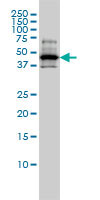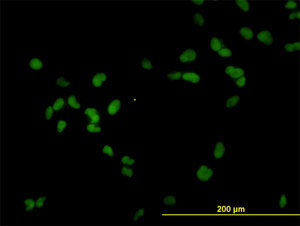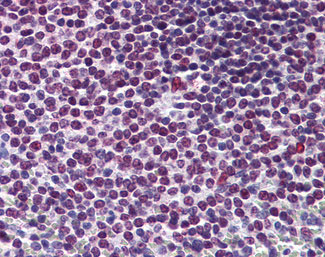RCC1 Antibody (clone 2F1)
Mouse Monoclonal Antibody
- SPECIFICATION
- CITATIONS
- PROTOCOLS
- BACKGROUND

Application
| WB, IHC-P, IF, E |
|---|---|
| Primary Accession | P18754 |
| Reactivity | Human |
| Host | Mouse |
| Clonality | Monoclonal |
| Clone Names | 2F1 |
| Calculated MW | 45kDa |
| Dilution | IF (10 µg/ml), IHC-P (5 µg/ml), WB (1:500-1:1000) |
| Gene ID | 1104 |
|---|---|
| Other Names | Regulator of chromosome condensation, Cell cycle regulatory protein, Chromosome condensation protein 1, RCC1, CHC1 |
| Target/Specificity | Human RCC1 |
| Reconstitution & Storage | Aliquot and store at -20°C or -80°C. Avoid freeze-thaw cycles. |
| Precautions | RCC1 Antibody (clone 2F1) is for research use only and not for use in diagnostic or therapeutic procedures. |
| Name | RCC1 |
|---|---|
| Synonyms | CHC1 |
| Function | Guanine-nucleotide releasing factor that promotes the exchange of Ran-bound GDP by GTP, and thereby plays an important role in RAN-mediated functions in nuclear import and mitosis (PubMed:1944575, PubMed:17435751, PubMed:20668449, PubMed:22215983, PubMed:11336674). Contributes to the generation of high levels of chromosome-associated, GTP-bound RAN, which is important for mitotic spindle assembly and normal progress through mitosis (PubMed:12194828, PubMed:17435751, PubMed:22215983). Via its role in maintaining high levels of GTP-bound RAN in the nucleus, contributes to the release of cargo proteins from importins after nuclear import (PubMed:22215983). Involved in the regulation of onset of chromosome condensation in the S phase (PubMed:3678831). Binds both to the nucleosomes and double- stranded DNA (PubMed:17435751, PubMed:18762580). |
| Cellular Location | Nucleus. Chromosome. Cytoplasm Note=Predominantly nuclear in interphase cells (PubMed:12194828). Binds to mitotic chromosomes (PubMed:12194828, PubMed:17435751, PubMed:20668449). |

Thousands of laboratories across the world have published research that depended on the performance of antibodies from Abcepta to advance their research. Check out links to articles that cite our products in major peer-reviewed journals, organized by research category.
info@abcepta.com, and receive a free "I Love Antibodies" mug.
Provided below are standard protocols that you may find useful for product applications.
Background
Guanine-nucleotide releasing factor that promotes the exchange of Ran-bound GDP by GTP. Involved in the regulation of onset of chromosome condensation in the S phase. Binds both to the nucleosomes and double-stranded DNA. RCC1-Ran complex (together with other proteins) acts as a component of a signal transmission pathway that detects unreplicated DNA. Plays a key role in nucleo- cytoplasmic transport, mitosis and nuclear-envelope assembly.
References
Ohtsubo M.,et al.Genes Dev. 1:585-593(1987).
Furuno N.,et al.Genomics 11:459-461(1991).
Puhl H.L. III,et al.Submitted (APR-2002) to the EMBL/GenBank/DDBJ databases.
Miyabashira J.,et al.J. Cell Sci. 107:2203-2208(1994).
Bischoff F.R.,et al.Proc. Natl. Acad. Sci. U.S.A. 87:8617-8621(1990).
If you have used an Abcepta product and would like to share how it has performed, please click on the "Submit Review" button and provide the requested information. Our staff will examine and post your review and contact you if needed.
If you have any additional inquiries please email technical services at tech@abcepta.com.













 Foundational characteristics of cancer include proliferation, angiogenesis, migration, evasion of apoptosis, and cellular immortality. Find key markers for these cellular processes and antibodies to detect them.
Foundational characteristics of cancer include proliferation, angiogenesis, migration, evasion of apoptosis, and cellular immortality. Find key markers for these cellular processes and antibodies to detect them. The SUMOplot™ Analysis Program predicts and scores sumoylation sites in your protein. SUMOylation is a post-translational modification involved in various cellular processes, such as nuclear-cytosolic transport, transcriptional regulation, apoptosis, protein stability, response to stress, and progression through the cell cycle.
The SUMOplot™ Analysis Program predicts and scores sumoylation sites in your protein. SUMOylation is a post-translational modification involved in various cellular processes, such as nuclear-cytosolic transport, transcriptional regulation, apoptosis, protein stability, response to stress, and progression through the cell cycle. The Autophagy Receptor Motif Plotter predicts and scores autophagy receptor binding sites in your protein. Identifying proteins connected to this pathway is critical to understanding the role of autophagy in physiological as well as pathological processes such as development, differentiation, neurodegenerative diseases, stress, infection, and cancer.
The Autophagy Receptor Motif Plotter predicts and scores autophagy receptor binding sites in your protein. Identifying proteins connected to this pathway is critical to understanding the role of autophagy in physiological as well as pathological processes such as development, differentiation, neurodegenerative diseases, stress, infection, and cancer.





